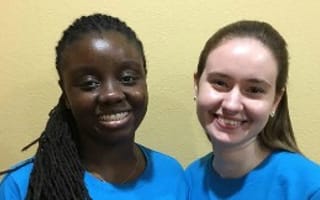
Just three months in, 2016 is already shaping up as a huge year for
.Back in January, the social good startup received a $250,000 grant from the Knight foundation to expand its range of information services for low income Americans. This month, its founders revealed they had spent the past three months in Silicon Valley as part of Y Combinator’s (YC) accelerator program.
Co-founded by Starter League graduates Rose Afriyie and Genevieve Nielsen, mRelief uses simple web forms and text message surveys to help its users determine whether they qualify for social services — an idea that came about when the founders discovered that $11 billion in food stamps goes unclaimed yearly.
 Though hardly cutting-edge tech, the company’s text messaging platform is one of its most innovative features. Most of us take Internet access for granted, but a 2015 Pew Research study found that 25 percent of adults who make less than $30,000 a year don’t use the Internet at all. In other words, a web-only service would be inaccessible to large swaths of precisely the population mRelief is trying to reach.
Though hardly cutting-edge tech, the company’s text messaging platform is one of its most innovative features. Most of us take Internet access for granted, but a 2015 Pew Research study found that 25 percent of adults who make less than $30,000 a year don’t use the Internet at all. In other words, a web-only service would be inaccessible to large swaths of precisely the population mRelief is trying to reach.
For a nonprofit like mRelief, getting into YC means getting access to the advice and resources provided to their for-profit peers, as well as receiving a $100,000 donation.
Like many founders who have gone through the accelerator, Afriyie and Nielsen said the program has been an invaluable opportunity for focus, away from the distractions of day-to-day life at home. But perhaps equally important was the way in which YC advisors Justin Kan and Michael Seibel — who grew Twitch from a niche video streaming site to a billion dollar business — pushed them to dream bigger.
“YC really did encourage us to think about our larger vision, and where we want to take our organization long term,” said Nielsen. “Although we sort of had conversations about it beforehand, I think it really helped us solidify our vision of being the new UI for social services. Not only to help people find out what they’re eligible for, but help them go through the whole process.”
For many social services recipients, who are often unable to get time off for a 9-to-5 government office visit to get help with their applications, this could be a game changer.
The team was also pushed to run more experiments at once, trying out a broader range of services. Nielsen said they’d normally be rolling out between one and four services and features at any one time. During YC, they were rolling out 10 to 12 simultaneously.
The hard work and experiments appear to be paying dividends so far. Afriyie said mRelief’s impact has been growing to the tune of 80 percent weekly in the past few months. This growth comes in part from expanding the nonprofit’s range of services, but the team has also been hard at work making the service easier to use for those already covered.
To this end, they’ve redesigned the site to make it easier to navigate. They’ve also added algorithms that draw on the information provided by users who don’t qualify for certain types of government services and nudge them toward other programs they may qualify for.
While they may have expanded the scope of their mission, mRelief’s founders say its focus and purpose remains the same.
“I think the DNA of mRelief is very much intact in terms of who we are and how we do this work,” said Afriyie. “We have always had a sustainability first-approach and really aspired towards that, and this experience has helped us flesh that out more.”
In order to build on its current momentum, the nonprofit is in the middle of a philanthropic seed round and hopes to reach $1 million raised by April 30.
Images via mRelief.
Do you have a tip for us? Shoot us an email or follow us on Twitter @BuiltInChicago.







